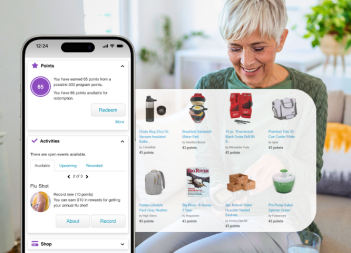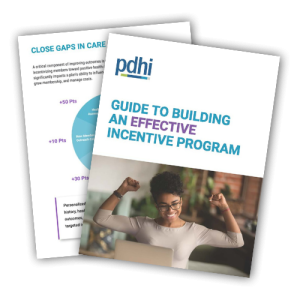A Comprehensive Guide to Building Effective Health Incentives

Beneficiary-targeted incentives have great potential in preventive care and health promotion. Unhealthy behavior is a significant cause of poor health outcomes and high healthcare costs. Offering a choice of rewards, such as gift cards for selected merchants, can motivate members to actively improve their health and decrease risks. Ultimately, incentives provide a win-win as health plans also benefit by increasing member engagement and improving HEDIS measures.
The Power of Incentives in Driving Healthy Actions
An increasing body of research demonstrates that incentive programs encourage Medicare and Medicaid members toward positive health actions. According to the Centers for Medicare & Medicaid Services, interventions that address the behavioral or social circumstances that influence participation in preventive health services will positively impact outcomes, improve health, and decrease health expenditure growth. Furthermore, a 2019 study in behavioral economics found that even small incentives can positively influence choices.
Interventions targeting behavioral and social determinants enhance health and control healthcare spending growth. Overcoming distrust and socioeconomic barriers is achievable through informative messaging and personalized incentives, creating a more inclusive approach to health promotion.
Member satisfaction is a key Health Outcomes Survey (HOS) and CAHPS scores metric. Aligning incentives with member preferences enhances satisfaction, fostering an engaged and health-conscious community.
Ideal Outcomes of Incentive Programs
The ideal outcomes of incentive programs extend beyond individual actions, encompassing broader healthcare goals.
- High levels of engagement – beneficiaries are aware of the program and are motivated to improve their lifestyle.
- Behavior changes and risk reduction – taking active steps to improve their health and lower risks.
- Healthcare utilization and costs – decrease costs and increase preventative care and prescribed medications.
- Budget neutrality – the program effectively promotes behavior change and reduces risks and healthcare costs that balance the program’s cost.
- Quality Improvement – Incentives can drive quality improvement initiatives in health plans and address social determinants of health. Tailored incentive programs can promote health equity and inclusivity.
Regulatory Compliance in Rewards & Incentives
Navigating the landscape of CMS guidelines for incentivizing members, including funding support for health plans can be complex. The 2022 Medicare Advantage plan regulations for Rewards and Incentives aim to promote racial equity and support underserved communities by requiring equal and non-discriminatory rewards to all eligible enrollees. While MA plans can incentivize HEDIS-related measures, all members who qualify for the plan benefit must be offered the same reward regardless of their HEDIS denominators or numerator status. Rewards must be voluntary and cannot rely on a member’s outcomes, such as BMI<30. Rather, they must target improvement for a specific outcome or completion of an activity. Review any disparities in data collection efforts in member interactions and procedures related to gender identity, race, disability, literacy, ethnicity, and language preferences to align with Proposed NCQA Standards.
The regulations also state that approved gift cards are allowed with restrictions (may include retailers like Walmart and Target but with exclusions for items such as alcohol, tobacco, and firearms). These regulations do not allow unrestricted gift cards, debit, and reloadable cards (including Visa, MasterCard, or Amazon). To learn how these regulations may affect your incentive program, visit the 2022 CMS Readiness Checklist.
Empowering Members with Accurate Incentive Information
Creating a sense of empowerment among members involves providing detailed and transparent information about various aspects of incentive programs. Clear communication on incentive-earning activities, participation requirements, earned rewards, and how to use them fosters member engagement. This transparency enhances member understanding and strengthens their engagement in health incentive programs, ultimately contributing to the success of the broader healthcare strategy.
Rewards That Members Want Most
Our reward fulfillment partner, Online Rewards, found that the most redeemed items differ based on the type of health plan:
Medicaid: Physical Walgreens gift cards
Medicare: Walmart Healthy Living physical laminated card that can be used at Walmart or online and local grocery store gift cards.
Commercial: Puffer jackets with long sleeves and branded Camelbak water bottle, available in 20 or 32-oz sizes.
Building Rewards Programs with PDHI
Partnering with a company with a proven track record in developing, customizing, and managing a successful incentives program for your membership is vital. PDHI’s Rewards Platform offers a flexible incentive management application that can issue rewards for individual actions or a combination approach, such as a reward earned when the member completes the health assessment and attends an Annual Wellness Visit. PDHI offers flexibility in reward type and fulfillment method to suit your plan’s goals and initiatives best. These rewards can be integrated into your member portal, giving the member visibility of rewards earned. Additionally, incentive awards can be consolidated from multiple sources, such as completing a health assessment or claim submissions. This reduces the effort on the member’s behalf, increasing the likelihood of engagement. PDHI continually works with leading health plans to build rewards and incentive programs that get results and drive member engagement.
Whether they service Medicare, Medicaid, or other plan members, health plans share a common goal: helping members stay healthy. Incentivizing members through PDHI Rewards allows you to close gaps in care, improve quality performance, and maximize your return on investment by encouraging members to take control of their health and well-being.


